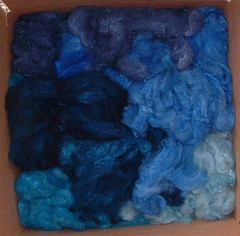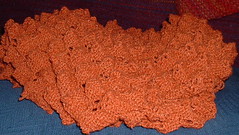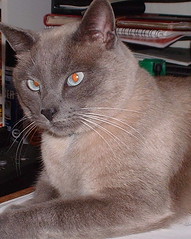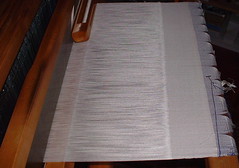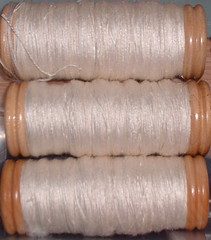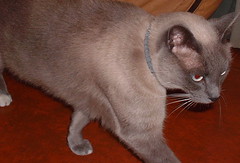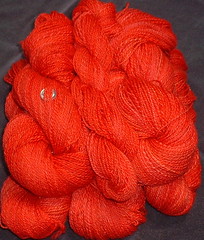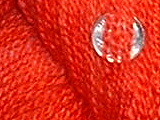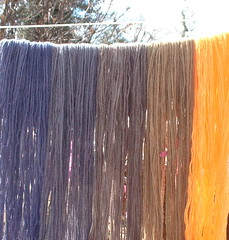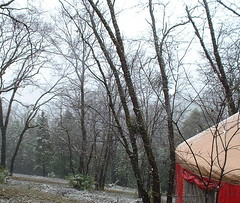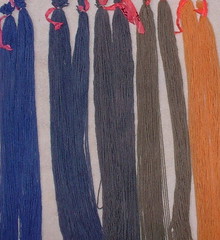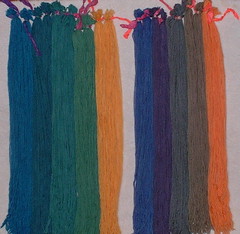For The Love of It
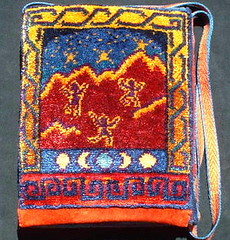
Who can predict the paths our lives will take? I am often asked how I got into weaving (or dyeing or spinning or beads). I can't remember. Weaving, at least, is part of my alien abduction event, a story for another day.
But really, I think, the core of the question is: why do we stick to it? Why do we do this stuff?
It must be fun. But it's not always.
It must be satisfying. But it's not always.
It must be rewarding. But it's not always.
It does not make economic sense. Neither as a consumer nor as a producer is the creation of textiles the path to riches. We consumers know there is no justification for spending $20 on sock yarn when socks are $6 a pair. And very few of us have been able to put a price on our work that brings satisfaction in the selling.
So it does not make us rich or famous or beautiful or sophisticated (hah!). But we persist. We knit and spin and dye and weave, and sometimes fling beads on everything, and call it good.
It has to be for the love of it.
It is rewarding to be capable. It is fun to solve little dilemmas, invent ways around blockades, create a finished work that suits, or fits, or is the right color, or feels just right (or not, and there are lots of *or nots*). It is satisfying to just make things.
That can't be all that sustains this practice. It might be an ingrained need to keep busy, an ancestral link to people who made things, an inherited ability to create. It might be Adult onset ADD.
Or it might just be for the love of it.
There are the people. Real people, in needlework groups, guilds and at conferences, who understand without words, share the same passion for the inexplicable, and provide support, encouragement, answers and companionship. The conncections we make are sometimes lasting, often important.
I've been encouraged, taught, helped, advised, congratulated and commiserated with by people who know little else of my life, but know that the textiles I create are important to me. The people who have done this are important to me. The people I meet at conferences and in classes are important to me, even if I meet them only once, or if I see them once a year, or once a month. They can be important even if they are virtual and I just read their blogs. We have a common language, an understood vocabulary, and such contact sustains me and keeps me doing all of this.
Textiles are a basic commodity all over the world. We in the developed West have a ruptured view of what it takes to create those textiles: on the whole, we are removed from the process. Those few of us who raise fiber animals, process the fiber, spin it, felt it, dye it, knit it, crochet and weave it, enjoy a connection with this basic commodity that overrides age, class, country and language barriers. We can communicate, on this subject, without distinction.
I once thought it was just so with textile people, until I went with my sister to a Rose Society meeting. The people there had that same enthusiasm about their plants as we do about textiles. Old and young, well heeled and penniless, they communicated with enthusiasm, shared where exotic and rare plants could be found (and how to rustle a clipping and sprout it!). Their eyes glowed and their hands waved as they talked about their passion: roses.
My sister is also a birder, her friends are birders, and much traveling surrounds her birding activity. Just like my life in textiles. My sons leap off of cliffs, and travel to places to find higher cliffs to leap off. They hang with friends who leap. They throw themselves down mountains, and then labor back up them, with ropes and bikes and snow-cats. Then they throw themselves back down.
Perhaps, to me, people who care about something are more interesting. People who do things are more interesting. People who have found things to be interested in, are interesting.
It's easy to be on the sidelines and criticize. It's easy to read all about it and think that you know. But the real evidence is in the doing. The real joy comes from doing, creating, and sharing that creation with people who understand, who don't say "but you could buy that for cheaper, and not waste all that time".
At the end of the process, I've enjoyed the time spent, *and* I have a product. Which, more often than not, I put in a box and jump right back in a make another.
It's not the product, although ostensibly that's why we start (I need a new shawl. heh.). It's the process, which, as we work through the projects, becomes more ingrained, easier to do, and in a meditative, thoughtless way (as in no thought is required to sustain the activity, we can just *do it*). Fingers dance across the stitches, stretch the fiber into yarn, and the mind is free to think, to remember, to contemplate, to plan, and to give thanks that over 30 years ago, the fingers started down this path.
It must be for the love of it. Why else?
